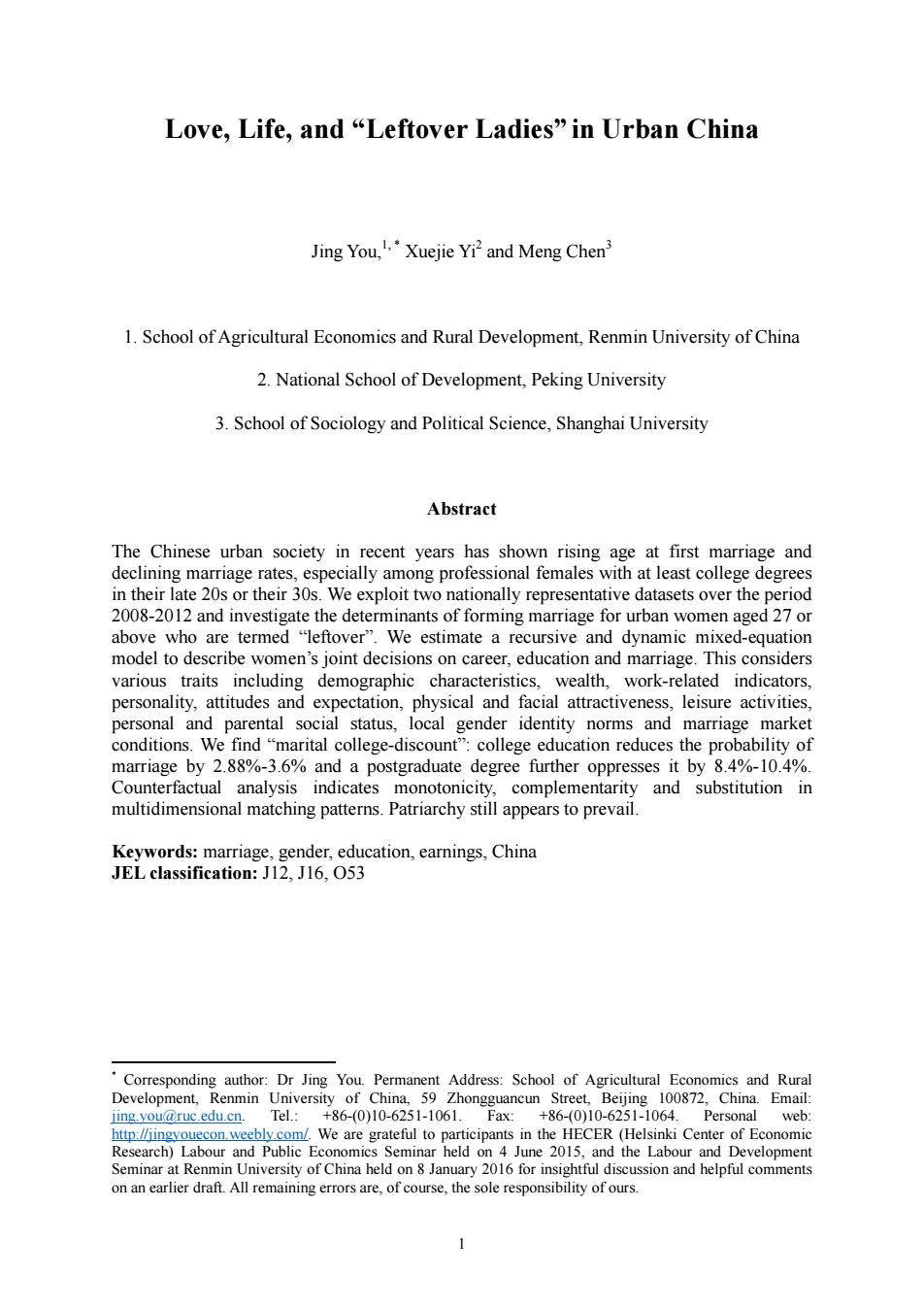正在加载图片...

Love,Life,and "Leftover Ladies"in Urban China Jing You,.'Xuejie Yi and Meng Chen3 1.School of Agricultural Economics and Rural Development,Renmin University of China 2.National School of Development,Peking University 3.School of Sociology and Political Science,Shanghai University Abstract The Chinese urban society in recent years has shown rising age at first marriage and declining marriage rates,especially among professional females with at least college degrees in their late 20s or their 30s.We exploit two nationally representative datasets over the period 2008-2012 and investigate the determinants of forming marriage for urban women aged 27 or above who are termed "leftover".We estimate a recursive and dynamic mixed-equation model to describe women's joint decisions on career,education and marriage.This considers various traits including demographic characteristics,wealth,work-related indicators, personality,attitudes and expectation,physical and facial attractiveness,leisure activities, personal and parental social status,local gender identity norms and marriage market conditions.We find"marital college-discount":college education reduces the probability of marriage by 2.88%-3.6%and a postgraduate degree further oppresses it by 8.4%-10.4%. Counterfactual analysis indicates monotonicity,complementarity and substitution in multidimensional matching patterns.Patriarchy still appears to prevail. Keywords:marriage,gender,education,earnings,China JEL classification:J12.J16.O53 Corresponding author:Dr Jing You.Permanent Address:School of Agricultural Economics and Rural Development,Renmin University of China,59 Zhongguancun Street,Beijing 100872,China.Email: iing.vou@ruc.edu.cn.Tel.:+86-(0)10-6251-1061.Fax:+86-(0)10-6251-1064.Personal web: http://jingyouecon weebly com/.We are grateful to participants in the HECER (Helsinki Center of Economic Research)Labour and Public Economics Seminar held on 4 June 2015,and the Labour and Development Seminar at Renmin University of China held on 8 January 2016 for insightful discussion and helpful comments on an earlier draft.All remaining errors are,of course,the sole responsibility of ours.1 Love, Life, and “Leftover Ladies” in Urban China Jing You,1, * Xuejie Yi2 and Meng Chen3 1. School of Agricultural Economics and Rural Development, Renmin University of China 2. National School of Development, Peking University 3. School of Sociology and Political Science, Shanghai University Abstract The Chinese urban society in recent years has shown rising age at first marriage and declining marriage rates, especially among professional females with at least college degrees in their late 20s or their 30s. We exploit two nationally representative datasets over the period 2008-2012 and investigate the determinants of forming marriage for urban women aged 27 or above who are termed “leftover”. We estimate a recursive and dynamic mixed-equation model to describe women’s joint decisions on career, education and marriage. This considers various traits including demographic characteristics, wealth, work-related indicators, personality, attitudes and expectation, physical and facial attractiveness, leisure activities, personal and parental social status, local gender identity norms and marriage market conditions. We find “marital college-discount”: college education reduces the probability of marriage by 2.88%-3.6% and a postgraduate degree further oppresses it by 8.4%-10.4%. Counterfactual analysis indicates monotonicity, complementarity and substitution in multidimensional matching patterns. Patriarchy still appears to prevail. Keywords: marriage, gender, education, earnings, China JEL classification: J12, J16, O53 * Corresponding author: Dr Jing You. Permanent Address: School of Agricultural Economics and Rural Development, Renmin University of China, 59 Zhongguancun Street, Beijing 100872, China. Email: jing.you@ruc.edu.cn. Tel.: +86-(0)10-6251-1061. Fax: +86-(0)10-6251-1064. Personal web: http://jingyouecon.weebly.com/. We are grateful to participants in the HECER (Helsinki Center of Economic Research) Labour and Public Economics Seminar held on 4 June 2015, and the Labour and Development Seminar at Renmin University of China held on 8 January 2016 for insightful discussion and helpful comments on an earlier draft. All remaining errors are, of course, the sole responsibility of ours